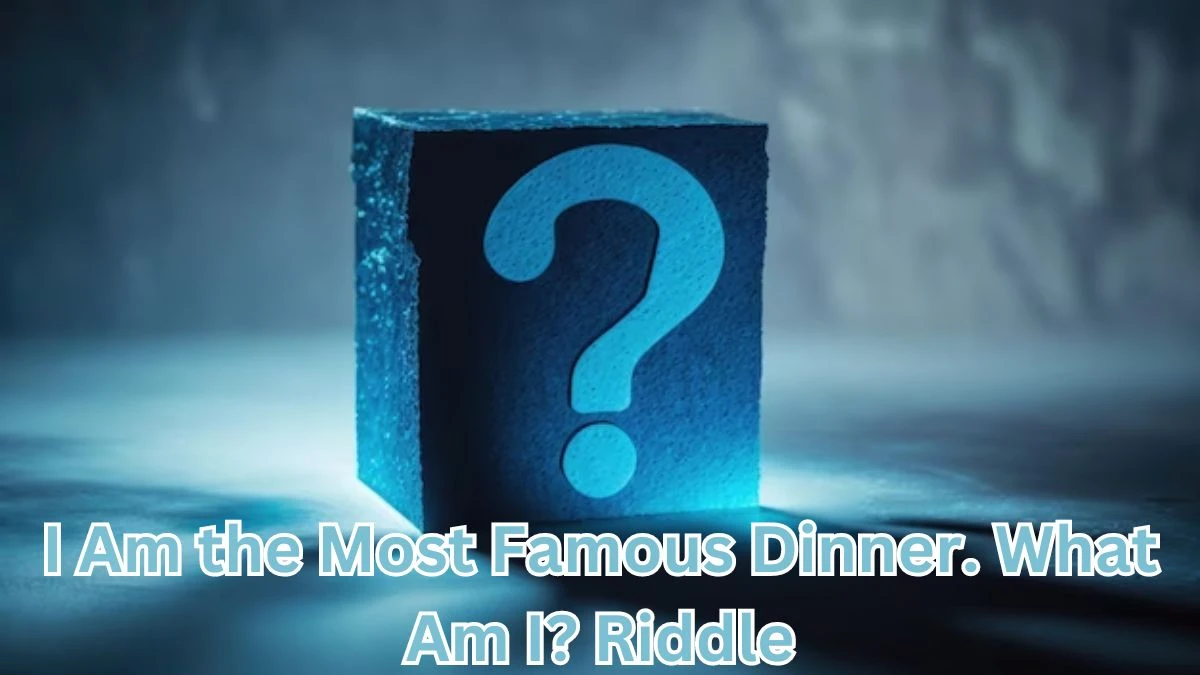- Rojgarlive »
- Riddle »
- I Am the Most Famous Dinner. What Am I? Riddle and Answer
I Am the Most Famous Dinner. What Am I? Riddle and Answer
by S Samayanka
Updated Feb 12, 2024

I Am the Most Famous Dinner. What Am I? Riddle
The riddle "I Am the Most Famous Dinner. What Am I?" challenges listeners to identify a globally renowned entity. Describing itself as the pinnacle of dinners, the riddle suggests an unparalleled level of fame and popularity. The use of the word "am" implies that the answer is a living entity rather than a mere meal.
The term "famous" further underscores the entity's widespread recognition and significant impact on culture or history. As the riddle remains unsolved for centuries, it intrigues individuals to ponder and explore the realms of renowned figures or events that have left an indelible mark on humanity. Through analysis and critical thinking, seekers aim to unravel the mystery encapsulated within this enigmatic riddle.
Riddle: I Am the Most Famous Dinner. What Am I?
I Am the Most Famous Dinner. What Am I? Riddle Answer
The answer to the riddle "I Am the Most Famous Dinner. What Am I?" lies in the Last Supper, an event steeped in historical and cultural significance. This dinner, immortalized in various forms of art and literature, serves as a symbol of communion, sacrifice, and love. Leonardo da Vinci's renowned painting depicting the Last Supper is revered as a masterpiece, further solidifying its fame. Beyond its religious connotations, the Last Supper's engineering marvel captivates individuals, requiring meticulous planning to accommodate its grandeur.
The enduring legacy of this iconic dinner transcends boundaries, resonating with people from diverse backgrounds and beliefs. Thus, the Last Supper emerges as the ultimate answer to the riddle, encapsulating the essence of fame, symbolism, and cultural resonance.
Answer: The Last Supper
What is Riddle?
A riddle is a form of enigmatic expression that challenges the intellect and encourages creative thinking. It typically presents a puzzling question or problem, often in a metaphorical or allegorical manner, with the goal of teasing out a clever and unexpected answer.
Riddles have been an integral part of human cultures throughout history, serving as a source of entertainment, mental stimulation, and sometimes even educational tools. They exist in various forms, from verbal puzzles to written or visual conundrums. Riddles often require lateral thinking, as they demand individuals to approach problems from unconventional angles to arrive at a solution.
In essence, a riddle is a playful and imaginative exercise that invites individuals to engage their cognitive abilities, fostering a sense of curiosity and the joy of unraveling mysteries. Whether used for amusement, social interaction, or intellectual development, riddles endure as timeless expressions of human ingenuity and the universal desire for mental challenges.
Benefits of Solving Riddle
- Mental Exercise: Engaging with riddles provides a mental workout, enhancing cognitive abilities and boosting critical thinking and problem-solving skills.
- Language Development: Riddles, often filled with wordplay and clever language usage, contribute to the enrichment of vocabulary. Regular exposure improves linguistic creativity and proficiency.
- Cultivation of Creativity: The process of unraveling riddles encourages thinking outside conventional boundaries, fostering creativity and imaginative thinking.
- Entertainment and Social Interaction: Solving riddles is an enjoyable activity, offering entertainment and amusement. It can be a social experience, promoting interaction and friendly competition.
- Educational Insights: Riddles often convey cultural or historical insights, serving as a playful means to learn about language, traditions, and societal aspects. They can be incorporated into educational settings for engaging learning.
- Confidence Building: Successfully solving challenging riddles instills a sense of accomplishment, boosting self-confidence, and encouraging perseverance when faced with mental challenges.
- Memory Enhancement: Recalling information from riddles contributes to memory improvement. The mental effort involved in solving them strengthens memory retention.
- Logical Reasoning Development: Riddles typically follow a logical structure, guiding individuals through a sequence of thoughts or deductions. This aids in the development of logical reasoning skills.
I Am the Most Famous Dinner. What Am I? Riddle - FAQs
A riddle is a puzzling question or problem that challenges the intellect and encourages creative thinking.
The Last Supper is an iconic event depicted in Leonardo da Vinci's famous painting, symbolizing communion, sacrifice, and love.
The Last Supper is globally renowned, steeped in historical and cultural significance, and immortalized in various forms of art and literature.
Solving riddles provides mental exercise, enhances language development, cultivates creativity, offers entertainment and social interaction, and imparts educational insights.
Solving riddles enhances critical thinking, problem-solving, language proficiency, creativity, logical reasoning, and memory retention.




